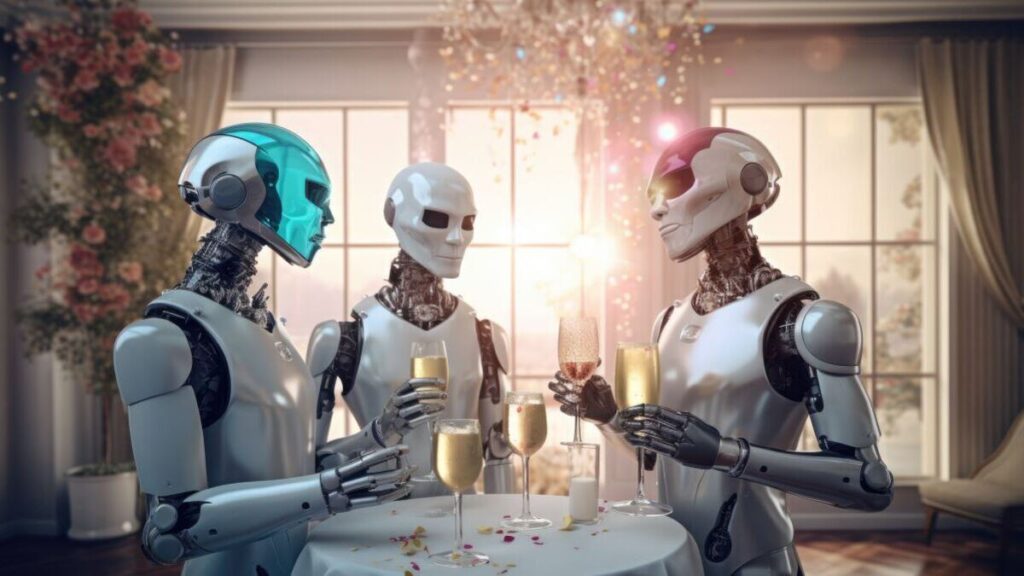Introduction
The idea of 2025 being the Year of Robot may sound like something out of a sci-fi movie. Still, we are closer than ever to living in a world where artificial intelligence (AI) and automation dominate various aspects of our lives. Over the past decade, technology has rapidly advanced, bringing AI-powered systems and robots into industries ranging from healthcare to finance and even our homes.
Many experts believe 2025 could be a turning point for AI and robotics, with automation becoming more sophisticated, efficient, and accessible. From self-driving cars hitting the roads to AI-powered personal assistants managing our schedules, we are on the brink of a new era where machines play an even bigger role in daily life. What does this signify for the future, though?
Will robots replace human workers, or will they complement our abilities and create new opportunities? Let’s dive deep into how AI and automation are transforming our world.
The Evolution of AI and Robotics
To understand why 2025 is considered the Year of Robot, it’s essential to look back at how AI and robotics have evolved. While the concept of robots has existed for centuries, it wasn’t until the 20th century that we saw real advancements in artificial intelligence.
A Brief History of AI and Robotics
The journey of AI began in the 1950s when scientists like Alan Turing started exploring machine intelligence. Over the years, AI saw significant breakthroughs with deep learning, neural networks, and natural language processing (NLP). Meanwhile, robotics advanced with industrial robots revolutionizing manufacturing in the 1970s and humanoid robots like ASIMO becoming a reality in the early 2000s.
Key Advancements Leading to 2025
The last decade has witnessed an explosion of AI capabilities. Machine learning algorithms now analyze massive datasets with unprecedented accuracy, computer vision enables facial recognition, and AI-powered chatbots handle customer service. Additionally, robots have become more agile, intelligent, and human-like, allowing them to perform complex tasks that once required human intervention.
With these advancements accelerating, experts predict that 2025 will begin a new era where AI and automation will be deeply embedded in all aspects of society.
How AI and Automation Are Transforming Industries
AI and automation are not just futuristic concepts; they are already revolutionizing industries today. Let’s explore how different sectors are being transformed by intelligent machines.
Healthcare: AI in Diagnostics and Robotic Surgeries
In healthcare, AI-powered diagnostic tools can more accurately analyze medical scans than human doctors. Companies like IBM Watson use AI to detect cancer early, improving patient outcomes. Additionally, robotic surgeons like the Da Vinci Surgical System assist in minimally invasive surgeries, reducing recovery times and increasing precision.
Manufacturing: The Rise of Smart Factories
Manufacturing has seen one of the biggest transformations due to automation. Factories now use robotic arms, 3D printing, and AI-driven quality control systems to improve efficiency. In Tesla’s Gigafactories, for instance, robots assemble electric cars with minimal human intervention, showcasing how automation shapes the future of production.
Retail: AI-Powered Shopping Experiences
AI is also changing the way we shop. Amazon Go stores, for example, use AI-powered cameras and sensors to eliminate the need for checkout lines. Additionally, personalized AI-driven recommendations on e-commerce platforms enhance customer experiences, making shopping more intuitive and efficient.
Finance: Automated Trading and AI-Driven Analysis
In finance, AI is used for fraud detection, algorithmic trading, and risk assessment. AI-powered robo-advisors help investors make smarter decisions, while automation speeds up transactions and enhances security in banking systems.
Transportation: The Era of Self-Driving Cars
One of the most anticipated advancements in AI is autonomous vehicles. Businesses investing significantly in self-driving technology include Tesla, Waymo, and Uber. By 2025, we might see fully autonomous taxis and delivery robots navigating our streets, reshaping urban mobility.
The Role of AI in Everyday Life
AI isn’t just for businesses—it’s already playing a major role in our daily lives. Whether you realize it or not, AI influences how we work, communicate, and entertain ourselves.
AI-Powered Personal Assistants
Virtual assistants like Siri, Alexa, and Google Assistant have become part of our routines, helping us set reminders, control smart devices, and answer questions. These AI assistants are continuously improving, making them more intuitive and responsive.
Smart Homes and IoT Integration
Home automation is another area where AI is making a significant impact. Smart thermostats, security cameras, and lighting systems powered by AI create convenient and energy-efficient living spaces. Imagine walking into a home where your voice controls everything—that’s the future AI is bringing.
AI in Entertainment
Streaming platforms like Netflix and Spotify use AI to personalize content recommendations, ensuring users always find something they like. Video game AI is also becoming more advanced, creating immersive experiences that adapt to player behavior.
Will Robots Replace Human Jobs?
With automation taking over various tasks, many fear robots will replace human workers. While it’s true that some jobs are at risk, new opportunities are also emerging.
Jobs at Risk of Automation
- Data entry and administrative jobs
- Manufacturing and warehouse roles
- Customer service and telemarketing
New Job Opportunities Created by AI
- AI and machine learning specialists
- Robotics engineers
- AI ethicists and policymakers
The key to thriving in the Year of Robot is adaptation. Instead of resisting change, individuals must embrace reskilling and upskilling to stay relevant in an AI-driven workforce.
Ethical and Social Concerns of AI and Robotics
As AI and robotics advance, they raise several ethical and social concerns. While automation offers many benefits, it also comes with challenges that society must address to ensure technology serves humanity rather than disrupts it.
AI Bias and Fairness in Decision-Making
One of the major concerns surrounding AI is bias. Since AI systems learn from existing data, they can sometimes reflect and even amplify biases present in that data. For example, facial recognition systems have been criticized for racial and gender biases, leading to incorrect identifications. Similarly, AI-driven hiring tools have been found to favor certain demographics over others, creating unfair job market conditions.
To prevent AI bias, companies must ensure that AI systems are trained on diverse datasets and continuously monitored for fairness. Ethical AI development should focus on transparency and accountability to avoid reinforcing discrimination.
Privacy Concerns with AI Surveillance
AI-powered surveillance systems are becoming increasingly common, with facial recognition, predictive policing, and smart monitoring devices used in various sectors. While these technologies can enhance security, they also raise serious privacy concerns.
For example, many cities now use AI-driven cameras to monitor public spaces, tracking individuals’ movements without consent. Similarly, AI in social media platforms collects vast amounts of personal data, often without users realizing the full extent of the monitoring.
To protect privacy, strict regulations and ethical guidelines must be implemented. Governments and organizations must balance security and individual rights, ensuring AI surveillance is used responsibly.
The Impact of Automation on Income Inequality
Automation is expected to create a wealth gap between those who own and control AI-driven businesses and those whose jobs are replaced by machines. This could lead to increased economic inequality, where lower-income workers struggle to find employment while high-skilled professionals in AI-related fields thrive.
To address this issue, policymakers must invest in education, reskilling programs, and universal basic income (UBI) initiatives to support workers transitioning to new careers. If appropriately managed, AI and robotics can create an inclusive economy where automation benefits everyone, not just a few.
The Future of Robotics: What’s Next Beyond 2025?
If 2025 is considered the Year of Robot, what will the future hold beyond this point? The coming decades promise even more significant advancements in AI and robotics, changing how we interact with technology and reshaping the world.
Predictions for the Next Decade
Experts predict that by 2035, we may see:
- Fully autonomous vehicles are becoming mainstream
- AI-powered robots performing complex surgeries without human supervision
- Widespread adoption of humanoid robots in customer service and personal assistance
- AI-driven creative work, including AI-generated music, movies, and literature
While these advancements are exciting, they also raise ethical and regulatory concerns that must be addressed as AI becomes more integrated into daily life.
The Potential for Human-AI Collaboration
Instead of replacing humans, AI has the potential to collaborate with us, enhancing our abilities rather than taking over completely. For example, AI-powered exoskeletons could help disabled individuals regain mobility, and robotic assistants could support doctors in complex surgeries.
Collaboration between humans and AI will likely be the future rather than complete automation. This approach ensures that human intuition, creativity, and ethics remain vital to decision-making, even in AI-driven.
AI Regulations and Ethical Guidelines
Governments worldwide are working on AI regulations to ensure AI is used responsibly. For example, the European Union’s AI Act aims to set legal guidelines for AI development and usage, prioritizing safety, fairness, and transparency.
Countries must work together to create a global AI framework that prevents misuse, ensures ethical AI practices, and fosters innovation without compromising security or human rights.
Conclusion
As we approach 2025, the question remains: Is 2025 truly the Year of Robot? With AI and automation advancing at an unprecedented rate, it’s clear that we are entering an era where robots and intelligent systems will play a more significant role in our daily lives. From transforming industries like healthcare and finance to changing how we interact with technology at home, AI is reshaping our world.
However, while automation offers many benefits, it also presents challenges. Ethical concerns, job displacement, and privacy issues must be addressed to ensure AI serves humanity rather than replacing it. The key to a successful AI-driven future is balancing automation with human oversight, ensuring that technology enhances our lives rather than controls them. So, is 2025 the Year of Robot? It may be the beginning.


